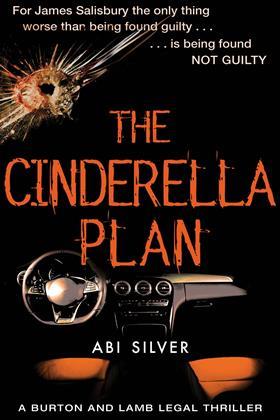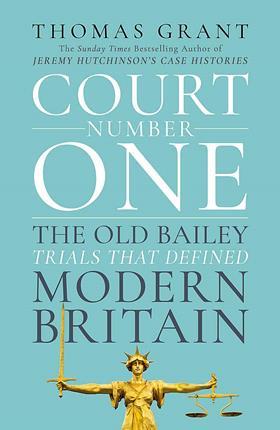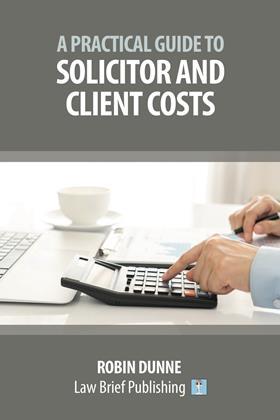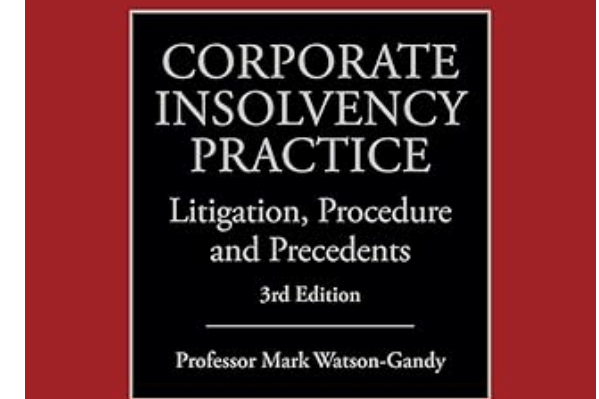Lawyers’ literary ambitions range across the genres, encompassing a fictional whatdunnit, a history of the Old Bailey, and an exploration of costs, says David Pickup
This has been another very good year for books written by and for lawyers. I am always impressed at the quality of the volumes on offer. It must be my age but this year I have noticed several books about planning for retirement and one for planning for the afterlife! At the other end of the scale, I was sent a book for junior lawyers. The range of books reflects the profession’s wide experience. However, one book I reviewed was written from two years’ experience, which did not seem much to base a book on, until I read another which was written from a few months’ knowledge.

I will start with a fiction book: The Cinderella Plan by Abi Silver (£8.99, Lightning Books). Written by a lawyer, there is a lot of authenticity in this book. In this unique tale about the shape of things to come, Silver asks if we rely on technology too much? This is a legal thriller about a tragic road traffic accident when a driverless car collides with a young family. It is more a whatdunnit than a whodunit. The man in the driving seat is a businessman who makes driverless cars and is about to expand the business. The horror of the accident is brutally described as well as its devastating effect on others. The central issue is whether the accident was the driver’s fault or the car’s. That question leads to all sorts of technological points about how information is recorded. It is a good story which discusses factual issues society will have to tackle. Previous books by the author have won well-deserved praise. .
Turning to history, there are several books available about the good old days pre-PACE when coppers were coppers. Scotland Yard’s Gangbuster: Bert Wickstead’s Most Celebrated Cases by Dick Kirby (£12.99, Pen & Sword True Crime) is the story of a copper’s fight against organised crime in the 1970s. Those were the days well before CCTV, DNA and disclosure or money laundering legislation. Although that world was very different, it faced similar problems to those we face today, such as racism and gangland culture. The tales are not without a certain humour. There is an account of how police raided a club and detained 60 people, including the whole audience and the band who continued to play for them while in custody.
It is not a story where solicitors have much of a role, though the police seem to have had a certain respect for judges and magistrates. It was a world where, according to the book, some cops were very dodgy to say the least, if not totally corrupt. The 1970s were not that long ago; there have been many changes since then for good and worse. This book is a vivid and fascinating account of policing some of the most serious crimes, written by an experienced, retired police officer.
Staying with history, Court Number One: The Old Bailey Trials that Defined Modern Britain by Thomas Grant QC (£25, John Murray) is an excellent read. The Old Bailey is built on the site of a medieval court of the Lord Mayor and Sheriffs of the City of London. It was rebuilt twice in the 18th century, and in 1834 it was renamed as the Central Criminal Court. The court still has links with the City of London Corporation which owns the building. In the 19th century, the Old Bailey was a courtroom adjacent to Newgate Prison and crowds were attracted to the many public hangings. It has been a venue for many criminal trials of national significance, which are the subject of this interesting book. Some court cases epitomise the period: whether they are murders between the wars, treason trials after the second world war, or the more recent prosecution of Jeremy Thorpe. The last account is of the Soham murder cases at the turn of this century. Many of these stories have impressive characters, including leading advocates such as Marshall Hall and Sir Patrick Hastings. This is both an excellent history of recent trials and a fascinating account of the workings of one of the most significant courts in the country.

Continuing the theme of books written by members of the bar there have been several books on advocacy. Advocacy: A Practical Guide by Peter Lyons (£19.95, Wildy, Simmonds and Hill Publishing) is very readable. Advocacy is a difficult subject to teach and many books on this subject are dull. It is like learning to dance from a handbook. The best way to learn is to get on up on your feet and have a go. There must be plenty of people who never get beyond a few tentative steps. Books on advocacy are full of mistakes to avoid and there is a certain schadenfreude in even members of the bar making dreadful howlers.
This book is first rate and can be read with pleasure and benefit by any advocate at any stage of their career. Everything we say or write is a type of advocacy as we are trying to persuade someone to do something. The greatest test of advocacy is persuading your client to accept advice. In 2005, a Crown court Judge asked an unfortunate barrister how long he had been a barrister. Counsel replied, ‘long enough’, to which the judge replied ‘but everything you say is utter rubbish’.
Trials of the State: Law and the Decline of Politics by Jonathan Sumption (£9.99, Profile Books Ltd) is an examination of how the country should be governed. It inevitably raises the question of whether there should be a written constitution and by this people mean one constitutional document with a basic law.
The writer is well equipped to deal with these issues. An eminent historian, Sumption was plucked straight from the bar to be appointed to the Supreme Court where he sat from 2012 to 2018. His analysis is erudite and clear. He compares our constitution with other countries and concludes, among other things, that we should probably not have a written (single document) constitution, that we should withdraw from the Convention on Human Rights, and that we should have our own legal instrument of basic law. Our constitution is not perfect but we muddle along. We are in a post-Brexit referendum era and some would say that having a referendum at all was a failure in political life. It was not the first referendum and there is still probably a case for occasional referendums on single issues of national importance. The idea that judges should decide everything of significance because they are dispassionate, well-trained and logical is questionable. Sumption calls on politicians to be better. We need excellence both in the judiciary and in parliament. This book is a real treat and addresses some of the most important issues of our time.
I have chosen the next mainly for its title: The Trouble with Lawyers by Deborah L. Rhode (£14.99, Oxford University Press). This book is not about the troubles we cause but the problems with the profession. Written by an American academic about the profession in that country, the author draws interesting parallels between the two countries. Rhode argues there are too many lawyers, too many students studying poor courses, and the profession is badly run by out-of-touch white middle class, mainly, men. The funding of legal aid in the USA seems to be dire indeed. Defense attorneys (if I can use the American spelling and terms) have on average about 2,500 cases per year. Lawyers in New Orleans spend on average seven minutes per case. It is common for a lawyer not to see client at all before trial, even in very serious matters. Few cases come to trial as they are plea bargained. Counsel have the mantra, ‘meet ’em, greet ’em, plead ’em’. CPD is compulsory in all but five states but it seems an excuse for a tax-deductible holiday. Courses include a baseball game with free hotdogs, an ethical afternoon watching movies and a Club Med holiday with judges.
My next choice is the only one not written by a lawyer. Last Orders; The Essential Guide to Your Letter of Wishes second edition by Patricia C Byron (£19.99, Stellar Books). It is not about drafting a will but the importance of preparing a letter of wishes to your executors. It is an excellent book and will make anyone – professional or client – have a long think about one of the most important things you have to do in life, namely die. Did you know that Frank Sinatra was buried with some coins so he could telephone home, or Elizabeth Taylor has Richard Burton’s love letters in her coffin?
I would expect most solicitors would suggest that clients should write a letter of wishes but we probably do not go into the detail required. This book was written from personal experience, of deaths of people close to the author, and the consequent difficulties in making arrangements. In today’s world, many new areas need to be considered, including online presence, how that is managed and how to find passwords. There is nowadays a very wide choice of type of funerals and wake. I find that not everyone knows what ‘wake’ is. Party does not seem right. Who is going to know what the client would want, if anything at all? There is a section on saving money. Clients have pets, children and businesses which need providing for (not necessarily in that order). Would executors know your collection of Sinatra records are rare and which dealer would be best to handle the sale?

My next two choices are a bit nerdy but here goes. A Practical Guide to Solicitor and Client Costs by Robin Dunne (£29.99, Law Brief Publishing) makes the point that solicitors constitute one of the most regulated professions when it comes to charging for work. Not only are we heavily regulated but the rules about our costs are complicated, and the case law is not always clear. Clarity is the golden rule, but that is not always easy at the start of a piece of work which may have unforeseen pitfalls and complications, which may depend on the vagaries of the courts system or the behaviour of other parties. The courts seem to be hard on us when it comes to costs. You cannot blame judges who insist that the client should have enough information to know whether he or she is being overcharged. Maybe we have ourselves to blame. We need to be clear and get things right first time. This is an area we would probably all benefit from knowing more about.
Legal Research: A Practitioner’s Handbook by Emily Allbon, Peter Clinch and Ian Hunter price (£49, Wildy, Simmonds & Hill publishing) focuses on the most important question for lawyers: what the law is on any given subject? How you can you be sure it is correct and to date? I once read that writing about the law is like photographing a small child; very difficult because the dear thing keeps moving. Life used to be so simple. You relied on your own knowledge or asked a clerk to look it up. Libraries consisted of student textbooks and an old green book. Then came books on CD discs, loose-leaf books which someone had to keep up to date. Today, so much is online.
Proper research is vital as mistakes can be embarrassing and costly. Research takes time and textbooks and access to online resources can be expensive. This all makes Legal Research, now in its third edition, a vital work of reference. As well as being a very useful book on how to research the law, it is a guide to the overwhelming number of different sources of legal information.
My last choice is a marvellous book written by solicitor Richard Martin. This Too Will Pass: Anxiety in the Professional World price (£11.99, Trigger Publishing) is a book that everyone should read. It is for anyone who has at some time had problems coping with work, relationships or whatever life throws at them; for people who employ someone who is troubled, and for all of us who support them. It is a brave and positive book. Martin who was a successful employment lawyer with a happy family and the lifestyle to match. Success led to increasing demands, more stress and eventual breakdown. As lawyers we are good talkers and problem solvers but not always good at fixing things about ourselves. Being open about these issues is difficult.
A lot of work has been done by the legal profession around the issues linked to this subject but there is room for more. How do we recognise or support colleagues in crisis and how we deal with stress? Lawyers are supposed to advise not to be advised. The problem for many is that work is our hobby as well as career and is often all consuming. We are in constant demand to do more work, such as join committees, run things and give free advice. We all need to be able to switch off or be allowed to switch off. Maybe a faith is the answer, or just something completely different to the day job, or just plain fun. We all need a hinterland.
David Pickup is a partner at Pickup & Scott Solicitors, Aylesbury
- Would you be interested in writing a book review for the Law Society Gazette? The Gazette receives books on a range of legal specialisms, as well as fiction, history and biography. If you are interested please write to Nicholas Goodman indicating your specialism
































No comments yet